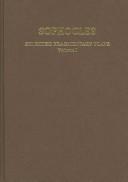| Listing 1 - 3 of 3 |
Sort by
|

ISBN: 0856687650 9780856687655 0856687669 9780856687662 9780856688928 9780856688874 0856688878 0856688924 Year: 2006 Volume: 1 Publisher: Oxford Aris and Phillips
Abstract | Keywords | Export | Availability | Bookmark
 Loading...
Loading...Choose an application
- Reference Manager
- EndNote
- RefWorks (Direct export to RefWorks)
Mythology, Greek --- Greek drama (Tragedy) --- History and criticism. --- Sophocles --- Criticism and interpretation. --- Literatura grega clássica (crítica e interpretação) --- Tragédia (literatura) --- Literatura grega clássica (crítica e interpretação). --- Tragédia (literatura). --- History and criticism --- Sofokles --- Sophocle --- Sofocle --- Sophokles --- Sofocles

ISBN: 0856687650 9780856687655 0856687669 9780856687662 9780856688928 9780856688874 0856688878 0856688924 Year: 2006 Publisher: Oxford [England] : Oxbow Books,
Abstract | Keywords | Export | Availability | Bookmark
 Loading...
Loading...Choose an application
- Reference Manager
- EndNote
- RefWorks (Direct export to RefWorks)
Book
ISBN: 9780271028101 Year: 1999 Publisher: University Park (Pa.) : Pennsylvania state university press,
Abstract | Keywords | Export | Availability | Bookmark
 Loading...
Loading...Choose an application
- Reference Manager
- EndNote
- RefWorks (Direct export to RefWorks)
In Homer's Traditional Art, Foley addresses three crucially interlocking areas that lead us to a fuller appreciation of the Homeric poems. He first explores the reality of Homer as their actual author, examining historical and comparative evidence to propose that "Homer" is a legendary and anthropomorphic figure rather than a real-life author. He next presents the poetic tradition as a specialized and highly resonant language bristling with idiomatic implication. Finally, he looks at Homer's overall artistic achievement, showing that it is best evaluated via a poetics aimed specifically at works that emerge from oral tradition. Homer's Traditional Art represents a disentangling of the interwoven strands of orality, textuality, and verbal art. It shows how we can learn to appreciate how Homer's art succeeds not in spite of the oral tradition in which it was composed but rather through its unique agency.
Analyse des formules orales. --- Epic poetry, Greek --- Epic poetry, Greek. --- Ilias (Homerus). --- Literatura grega clássica (crítica e interpretação). --- Odyssea (Homerus). --- Oral tradition --- Oral tradition. --- Oral-formulaic analysis. --- Poésie épique grecque --- Rhetoric, Ancient. --- Rhétorique ancienne. --- Rhétorique antique. --- Technique. --- Tradition orale --- History and criticism. --- Histoire et critique. --- Histoire --- Homer --- Homer. --- Homère --- Homère, --- Homero. --- Critique et interprétation. --- Style. --- Greece.
| Listing 1 - 3 of 3 |
Sort by
|

 Search
Search Feedback
Feedback About UniCat
About UniCat  Help
Help News
News